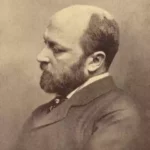 | |
The Married Son | |
| Author | Henry James |
|---|---|
| Published |
1875
|
| Language | English |
| Nationality | American |
| Genre | American Literature, Psychological Fiction |
1875 Short Story
The Married Son
The Married Son is an English American Literature, Psychological Fiction short story by American writer Henry James. It was first published in 1875. The Married Son was retrieved from the anthology, The Whole Family, A Novel by Twelve Authors.
The Married Son
by Henry James
It’s evidently a great thing in life to have got hold of a convenient expression, and a sign of our inordinate habit of living by words. I have sometimes flattered myself that I live less exclusively by them than the people about me; paying with them, paying with them only, as the phrase is (there I am at it, exactly, again!) rather less than my companions, who, with the exception, perhaps, a littlesometimes!of poor Mother, succeed by their aid in keeping away from every truth, in ignoring every reality, as comfortably as possible. Poor Mother, who is worth all the rest of us put together, and is really worth two or three of poor Father, deadly decent as I admit poor Father mainly to be, sometimes meets me with a look, in some connection, suggesting that, deep within, she dimly understands, and would really understand a little better if she weren’t afraid to: for, like all of us, she lives surrounded by the black forest of the facts of life very much as the people in the heart of Africa live in their dense wilderness of nocturnal terrors, the mysteries and monstrosities that make them seal themselves up in the huts as soon as it gets dark. She, quite exquisite little Mother, would often understand, I believe, if she dared, if she knew how to dare; and the vague, dumb interchange then taking place between us, and from the silence of which we have never for an instant deviated, represents perhaps her wonder as to whether I mayn’t on some great occasion show her how.
The difficulty is that, alas, mere intelligent useless wretch as I am, I’ve never hitherto been sure of knowing how myself; for am I too not as steeped in fears as any of them? My fears, mostly, are different, and of different dangersalso I hate having them, whereas they love them and hug them to their hearts; but the fact remains that, save in this private precinct of my overflow, which contains, under a strong little brass lock, several bad words and many good resolutions, I have never either said or done a bold thing in my life. What I seem always to feel, doubtless cravenly enough, under her almost pathetic appeal, has been that it isn’t yet the occasion, the really good and right one, for breaking out; than which nothing could more resemble of course the inveterate argument of the helpless. ANY occasion is good enough for the helpful; since there’s never any that hasn’t weak sides for their own strength to make up. However, if there COULD be conceivably a good one, I’ll be hanged if I don’t seem to see it gather now, and if I sha’n’t write myself here poor Charles Edward in all truth by failing to take advantage of it, (They have in fact, I should note, one superiority of courage to my own: this habit of their so constantly casting up my poverty at mepoverty of character, of course I mean, for they don’t, to do them justice, taunt me with having made so little. They don’t, I admit, take their lives in their hands when they perform that act; the proposition itself being that I haven’t the spirit of a fished-out fly.)
My point is, at any rate, that I designate THEM as Poor only in the abysmal confidence of these occult pages: into which I really believe even my poor wifefor it’s universal!has never succeeded in peeping. It will be a shock to me if I some day find she has so far adventuredand this not on account of the curiosity felt or the liberty taken, but on account of her having successfully disguised it. She knows I keep an intermittent diaryI’ve confessed to her it’s the way in which I work things in general, my feelings and impatiences and difficulties, off. It’s the way I work off my nervesthat luxury in which poor Charles Edward’s natural narrow meansnarrow so far as ever acknowledgeddon’t permit him to indulge. No one for a moment suspects I have any nerves, and least of all what they themselves do to them; no one, that is, but poor little Mother againwho, however, again, in her way, all timorously and tenderly, has never mentioned it: any more than she has ever mentioned her own, which she would think quite indecent. This is precisely one of the things that, while it passes between us as a mute assurance, makes me feel myself more than the others verily HER child: more even than poor little Peg at the present strained juncture.
But what I was going to say above all is that I don’t care that poor Lorrainesince that’s my wife’s inimitable name, which I feel every time I write it I must apologize even to myself for!should quite discover the moments at which, first and last, I’ve worked HER off. Yet I’ve made no secret of my cultivating it as a resource that helps me to hold out; this idea of our holding out, separately and together, having become for usand quite comically, as I seethe very basis of life. What does it mean, and how and why and to what end are we holding? I ask myself that even while I feel how much we achieve even by just hugging each other over the general intensity of it. This is what I have in mind as to our living to that extent by the vain phrase; as to our really from time to time winding ourselves up by the use of it, and winding each other. What should we do if we didn’t hold out, and of what romantic, dramatic, or simply perhaps quite prosaic, collapse would giving in, in contradistinction, consist for us? We haven’t in the least formulated thatthough it perhaps may but be one of the thousand things we are afraid of.
At any rate we don’t, I think, ever so much as ask ourselves, and much less each other: we’re so quite sufficiently sustained and inflamed by the sense that we’re just doing it, and that in the sublime effort our union is our strength. There must be something in it, for the more intense we make the consciousnessand haven’t we brought it to as fine a point as our frequently triumphant partnership at bridge?the more it positively does support us. Poor Lorraine doesn’t really at all need to understand in order to believe; she believes that, failing our exquisite and intimate combined effort of resistance, we should be capable together of somethingwell, desperate. It’s in fact in this beautiful desperation that we spend our days, that we face the pretty grim prospect of new ones, that we go and come and talk and pretend, that we consort, so far as in our deep-dyed hypocrisy we do consort, with the rest of the Family, that we have Sunday supper with the Parents and emerge, modestly yet virtuously shining, from the ordeal; that we put in our daily appearance at the Worksfor a utility nowadays so vague that I’m fully aware (Lorraine isn’t so much) of the deep amusement I excite there, though I also recognize how wonderfully, how quite charitably, they manage not to break out with it: bless, for the most part, their dear simple hearts! It is in this privately exalted way that we bear in short the burden of our obloquy, our failure, our resignation, our sacrifice of what we should have liked, even if it be a matter we scarce dare to so much as name to each other; and above all of our insufferable reputation for an abject meekness. We’re really not meek a bitwe’re secretly quite ferocious; but we’re held to be ashamed of ourselves not only for our proved business incompetence, but for our lack of first-rate artistic power as well: it being now definitely on record that we’ve never yet designed a single type of ice-pitchersince that’s the damnable form Father’s production more and more runs to; his uncanny ideal is to turn out more ice-pitchers than any firm in the worldthat has taken with their awful public. We’ve tried again and again to strike off something hideous enough, but it has always in these cases appeared to us quite beautiful compared to the object finally turned out, on their improved lines, for the unspeakable market; so that we’ve only been able to be publicly rueful and depressed about it, and to plead practically, in extenuation of all the extra trouble we saddle them with, that such things are, alas, the worst we can do.
We so far succeed in our plea that we’re held at least to sit, as I say, in contrition, and to understand how little, when it comes to a reckoning, we really pay our way. This actually passes, I think for the main basis of our humility, as it’s certainly the basis of what I feel to be poor Mother’s unuttered yearning. It almost broke her heart that we SHOULD have to live in such shameshe has only got so far as that yet. But it’s a beginning; and I seem to make out that if I don’t spoil it by any wrong word, if I don’t in fact break the spell by any wrong breath, she’ll probably come on further. It will glimmer upon hersome day when she looks at me in her uncomfortable bewildered tenderness, and I almost hypnotize her by just smiling inscrutably backthat she isn’t getting all the moral benefit she somehow ought out of my being so pathetically wrong; and then she’ll begin to wonder and wonder, all to herself, if there mayn’t be something to be said for me. She has limped along, in her more or less dissimulated pain, on this apparently firm ground that I’m so wrong that nothing will do for either of us but a sweet, solemn, tactful agreement between us never to mention it. It falls in so richly with all the other things, all the real things, we never mention.
Well, it’s doubtless an odd fact to be setting down even here; but I SHALL be sorry for her on the day when her glimmer, as I have called it, broadenswhen it breaks on her that if I’m as wrong as this comes to, why the others must be actively and absolutely right. She has never had to take it quite THAT wayso women, even mothers, wondrously get on; and heaven help her, as I say, when she shall. She’ll be immensetactfully immense, with Father about itshe’ll manage that, for herself and for him, all right; but where the iron will enter into her will be at the thought of her having for so long given raison, as they say in Parisor as poor Lorraine at least says they sayto a couple like Maria and Tom Price. It comes over her that she has taken it largely from THEM (and she HAS) that we’re living in immorality, Lorraine and I: ah THEN, poor dear little Mother! Upon my word I believe I’d go on lying low to this positive pitch of grovellingand Lorraine, charming, absurd creature, would back me up in it tooin order precisely to save Mother such a revulsion. It will be really more trouble than it will be worth to her; since it isn’t as if our relation weren’t, of its kind, just as we are, about as dear as it can be.
I’d literally much rather help her not to see than to see; I’d much rather help her to get on with the others (yes, even including poor Father, the fine damp plaster of whose composition, renewed from week to week, can’t be touched anywhere without letting your finger in, without peril of its coming to pieces) in the way easiest for herif not easiest TO her. She couldn’t live with the others an hourno, not with one of them, unless with poor little Pegsave by accepting all their premises, save by making in other words all the concessions and having all the imagination. I ask from her nothing of thisI do the whole thing with her, as she has to do it with them; and of this, au fond, as Lorraine again says, she is ever so subtly awarejust as, FOR it, she’s ever so dumbly grateful. Let these notes stand at any rate for my fond fancy of that, and write it here to my credit in letters as big and black as the tearful alphabet of my childhood; let them do this even if everything else registers meaner things. I’m perfectly willing to recognize, as grovellingly as any one likes, that, as grown-up and as married and as preoccupied and as disillusioned, or at least as battered and seasoned (by adversity) as possible, I’m in respect to HER as achingly filial and as feelingly dependent, all the time, as when I used, in the far-off years, to wake up, a small blubbering idiot, from frightening dreams, and refuse to go to sleep again, in the dark, till I clutched her hands or her dress and felt her bend over me.
She used to protect me then from domestic derisionfor she somehow kept such passages quiet; but she can’t (it’s where HER ache comes in!) protect me now from a more insidious kind. Well, now I don’t care! I feel it in Maria and Tom, constantly, who offer themselves as the pattern of success in comparison with which poor Lorraine and I are nowhere. I don’t say they do it with malice prepense, or that they plot against us to our ruin; the thing operates rather as an extraordinary effect of their mere successful blatancy. They’re blatant, truly, in the superlative degree, and I call them successfully so for just this reason, that poor Mother is to all appearance perfectly unaware of it. Maria is the one member of all her circle that has got her really, not only just ostensibly, into training; and it’s a part of the general irony of fate that neither she nor my terrible sister herself recognizes the truth of this. The others, even to poor Father, think they manage and manipulate her, and she can afford to let them think it, ridiculously, since they don’t come anywhere near it. She knows they don’t and is easy with them; playing over Father in especial with finger-tips so lightly resting and yet so effectively tickling, that he has never known at a given moment either where they were or, in the least, what they were doing to him. That’s enough for Mother, who keeps by it the freedom other soul; yet whose fundamental humility comes out in its being so hidden from her that her eldest daughter, to whom she allows the benefit of every doubt, does damnably boss her.
This is the one case in which she’s not lucid; and, to make it perfect, Maria, whose humility is neither fundamental nor superficial, but whose avidity is both, comfortably cherishes, as a ground of complaintnurses in fact, beatifically, as a wrongthe belief that she’s the one person without influence. Influence?why she has so much on ME that she absolutely coerces me into making here these dark and dreadful remarks about her! Let my record establish, in this fashion, that if I’m a clinging son I’m, in that quarter, to make up for it, a detached brother. Deadly virtuous and deadly hard and deadly charmlessalso, more than anything, deadly sure Ihow does Maria fit on, by consanguinity, to such amiable characters, such REAL social values, as Mother and me at all? If that question ceases to matter, sometimes, during the week, it flares up, on the other hand, at Sunday supper, down the street, where Tom and his wife, overwhelmingly cheerful and facetious, contrast so favorably with poor gentle sickly (as we doubtless appear) Lorraine and me. We can’t meet themthat is I can’t meet Tomon that ground, the furious football-field to which he reduces conversation, making it echo as with the roar of the arenaone little bit.
Of course, with such deep diversity of feeling, we simply loathe each other, he and I; but the sad thing is that we get no good of it, none of the TRUE joy of life, the joy of our passions and perceptions and desires, by reason of our awful predetermined geniality and the strange abysmal necessity of our having so eternally to put up with each other. If we could intermit that vain superstition somehow, for about three minutes, I often think the air might clear (as by the scramble of the game of General Post, or whatever they call it) and we should all get out of our wrong corners and find ourselves in our right, glaring from these positions a happy and natural defiance. Then I shouldn’t be thus nominally and pretendedly (it’s too ignoble!) on the same side or in the same air as my brother-in-law; whose value is that he has thirty business ideas a day, while I shall never have had the thirtieth fraction of one in my whole life. He just hums, Tom Price, with business ideas, whereas I just gape with the impossibility of them; he moves in the densest we carry our heads here on August evenings, each with its own thick nimbus of mosquitoes. I’m but too conscious of how, on the other hand, I’m desolately outlined to all eyes, in an air as pure and empty as that of a fine Polar sunset.
It was Lorraine, dear quaint thing, who some time ago made the remark (on our leaving one of those weekly banquets at which we figure positively as a pair of social skeletons) that Tom’s facetae multiply, evidently, in direct proportion to his wealth of business ideas; so that whenever he’s enormously funny we may take it that he’s on something tremendous. He’s sprightly in proportion as he’s in earnest, and innocent in proportion as he’s going to be dangerous; dangerous, I mean, to the competitor and the victim. Indeed when I reflect that his jokes are probably each going to cost certain people, wretched helpless people like myself, hundreds and thousands of dollars, their abundant flow affects me as one of the most lurid of exhibitions. I’ve sometimes rather wondered that Father can stand so much of him. Father who has after all a sharp nerve or two in him, like a razor gone astray in a valise of thick Jager underclothing; though of course Maria, pulling with Tom shoulder to shoulder, would like to see any one NOT stand her husband.
The explanation has struck me as, mostly, that business genial and cheerful and even obstreperous, without detriment to its BEING business, has been poor Father’s ideal for his own terrible kind. This ideal is, further, that his home-life shall attest that prosperity. I think it has even been his conception that our family tone shall by its sweet innocence fairly register the pace at which the Works keep ahead: so that he has the pleasure of feeling us as funny and slangy here as people can only be who have had the best of the bargains other people are having occasion to rue. We of course don’t knowthat is Mother and Grandmamma don’t, in any definite way (any more than I do, thanks to my careful stupidity) how exceeding small some of the material is consciously ground in the great grim, thrifty mill of industrial success; and indeed we grow about as many cheap illusions and easy comforts in the faintly fenced garden of our little life as could very well be crammed into the space.
Poor Grandmammasince I’ve mentioned herappears to me always the aged wan Flora of our paradise; the presiding divinity, seated in the centre, under whose pious traditions, REALLY quite dim and outlived, our fond sacrifices are offered. Queer enough the superstition that Granny is a very solid and strenuous and rather grim person, with a capacity for facing the world, that we, a relaxed generation, have weakly lost. She knows as much about the world as a tin jelly-mould knows about the dinner, and is the oddest mixture of brooding anxieties over things that don’t in the least matter and of bland failure to suspect things that intensely do. She lives in short in a weird little waste of wordsover the moral earnestness we none of us cultivate; yet hasn’t a notion of any effective earnestness herself except on the subject of empty bottles, which have, it would appear, noble neglected uses. At this time of day it doesn’t matter, but if there could have been dropped into her empty bottles, at an earlier stage, something to strengthen a little any wine of life they were likely to contain, she wouldn’t have figured so as the head and front of all our sentimentality.
I judge it, for that matter, a proof of our flat modernity in this order that the scant starch holding her together is felt to give her among us this antique and austere consistency. I don’t talk things over with Lorraine for nothing, and she does keep for me the flashes of perception we neither of us waste on the others. It’s the antiquity of the age of crinoline, she said the other day a propos of a little carte-de-visite photograph of my ancestress as a young woman of the time of the War; looking as if she had been violently inflated from below, but had succeeded in resisting at any cost, and with a strange intensity of expression, from her waist up. Mother, however, I must say, is as wonderful about her as about everything else, and arranges herself, exactly, to appear a mere contemporary illustration (being all the while three times the true picture) in order that her parent shall have the importance of the Family Portrait. I don’t mean of course that she has told me so; but she cannot see that if she hasn’t that importance Granny has none other; and it’s therefore as if she pretended she had a ruff, a stomacher, a farthingale and all the restgrand old angles and eccentricities and fine absurdities: the hard white face, if necessary, of one who has seen witches burned.
She hasn’t any more than any one else among us a gleam of fine absurdity: that’s a product that seems unable, for the life of it, and though so indispensable (say) for literary material, to grow here; but, exquisitely determined she shall have Character lest she perishwhile it’s assumed we still need herMother makes it up for her, with a turn of the hand, out of bits left over from her own, far from economically as her own was originally planned; scraps of spiritual silk and velvet that no one takes notice of missing. And Granny, as in the dignity of her legend, imposes, ridiculous old woman, on every oneGranny passes for one of the finest old figures in the place, while Mother is never discovered. So is history always written, and so is truth mostly worshipped. There’s indeed one thing, I’ll do her the justice to say, as to which she has a glimmer of visionas to which she had it a couple of years ago; I was thoroughly with her in her deprecation of the idea that Peggy should be sent, to crown her culture, to that horrid co-educative college from which the poor child returned the other day so preposterously engaged to be married; and, if she had only been a little more actively with me we might perhaps between us have done something about it. But she has a way of deprecating with her long, knobby, mittened hand over her mouth, and of looking at the same time, in a mysterious manner, down into one of the angles of the roomit reduces her protest to a feebleness: she’s incapable of seeing in it herself more than a fraction of what it has for her, and really thinks it would be wicked and abandoned, would savor of Criticism, which is the cardinal sin with her, to see all, or to follow any premise to it in the right direction.
Still, there was the happy chance, at the time the question came up, that she had retained, on the subject of promiscuous colleges, the mistrust of the age of crinoline: as to which in fact that little old photograph, with its balloon petticoat and its astonishingly flat, stiff torso, might have imaged some failure of the attempt to blow the heresy into her. The true inwardness of the history, at the crisis, was that our fell Maria had made up her mind that Peg should goand that, as I have noted, the thing our fell Maria makes up her mind to among us is in nine cases out of ten the thing that is done. Maria still takes, in spite of her partial removal to a wider sphere, the most insidious interest in us, and the beauty of her affectionate concern for the welfare of her younger sisters is the theme of every tongue. She observed to Lorraine, in a moment of rare expansion, more than a year ago, that she had got their two futures perfectly fixed, and that as Peggy appeared to have some mind, though how much she wasn’t yet sure, it should be developed, what there was of it, on the highest modern lines: Peggy would never be thought generally, that is physically, attractive anyway. She would see about Alice, the brat, later on, though meantime she had her ideathe idea that Alice was really going to have the looks and would at a given moment break out into beauty: in which event she should be run for that, and for all it might be worth, and she, Maria, would be ready to take the contract.
This is the kind of patronage of us that passes, I believe, among her more particular intimates, for so sweet of her; it being of course Maria all over to think herself subtle for just reversing, with a Theresee how original I am? any benighted conviction usually entertained. I don’t know that any one has ever thought Alice, the brat, intellectual; but certainly no one has ever judged her even potentially handsome, in the light of no matter which of those staggering girl-processes that suddenly produce features, in flat faces, and figure, in the void of space, as a conjurer pulls rabbits out of a sheet of paper and yards of ribbon out of nothing. Moreover, if any one SHOULD know, Lorraine and I, with our trained sense for form and for values, certainly would. However, it doesn’t matter; the whole thing being but a bit of Maria’s system of bluffing in order to boss. Peggy hasn’t more than the brain, in proportion to the rest of her, of a small swelling dove on a window-sill; but she’s extremely pretty and absolutely nice, a little rounded pink-billed presence that pecks up gratefully any grain of appreciation.
I said to Mother, I remember, at the timeI took that plunge: I hope to goodness you’re not going to pitch that defenceless child into any such bear garden! and she replied that to make a bear-garden you first had to have bears, and she didn’t suppose the co-educative young men could be so described. Well then, said I, would you rather I should call them donkeys, or even monkeys? What I mean is that the poor girla perfect little DECORATIVE person, who ought to have iridescent-gray plumage and pink-shod feet to match the rest of hershouldn’t be thrust into any general menagerie-cage, but be kept for the dovecote and the garden, kept where we may still hear her coo. That’s what, at college, they’ll make her unlearn; she’ll learn to roar and snarl with the other animals. Think of the vocal sounds with which she may come back to us! Mother appeared to think, but asked me, after a moment, as a result of it, in which of the cages of the New York Art League menagerie, and among what sort of sounds, I had found Lorrainewho was a product of co-education if there ever had been one, just as our marriage itself had been such a product.
I replied to thiswell, what I could easily reply; but I asked, I recollect, in the very forefront, if she were sending Peg to college to get married. She declared it was the last thing she was in a hurry about, and that she believed there was no danger, but her great argument let the cat out of the bag. Maria feels the want of itof a college education; she feels it would have given her more confidence; and I shall in fact never forget the little look of strange supplication that she gave me with these words. What it meant was: Now don’t ask me to go into the question, for the moment, any further: it’s in the acute stageand you know how soon Maria can BRING a question to a head. She has settled it with your Fatherin other words has settled it FOR him: settled it in the sense that we didn’t give HER, at the right time, the advantage she ought to have had. It would have given her confidencefrom the want of which, acquired at that age, she feels she so suffers; and your Father thinks it fine of her to urge that her little sister shall profit by her warning. Nothing works on him, you know, so much as to hear it hinted that we’ve failed of our duty to any of you; and you can see how it must work when he can be persuaded that Maria!
Hasn’t colossal cheek?I took the words out of her mouth. With such colossal cheek what NEED have you of confidence, which is such an inferior form?
The long and short was of course that Peggy went; believing on her side, poor dear, that it might for future relations give her the pull of Maria. This represents, really, I think, the one spark of guile in Peggy’s breast: the smart of a small grievance suffered at her sister’s hands in the dim long-ago. Maria slapped her face, or ate up her chocolates, or smeared her copy-book, or something of that sort; and the sound of the slap still reverberates in Peg’s consciousness, the missed sweetness still haunts her palate, the smutch of the fair page (Peg writes an immaculate little hand and Maria a wretched onethe only thing she can’t swagger about) still affronts her sight. Maria also, to do her justice, has a vague hankering, under which she has always been restive, to make up for the outrage; and the form the compunction now takes is to get her away. It’s one of the facts of our situation all round, I may thus add, that every one wants to get some one else away, and that there are indeed one or two of us upon whom, to that end, could the conspiracy only be occult enoughwhich it can never!all the rest would effectively concentrate.
Father would like to shunt Grannyit IS monstrous his having his mother-in-law a fixture under his roof; though, after all, I’m not sure this patience doesn’t rank for him as one of those domestic genialities that allow his conscience a bolder and tighter business hand; a curious service, this sort of thing, I note, rendered to the business conscience throughout our community. Mother, at any rate, and small blame to her, would like to shoo off Eliza, as Lorraine and I, in our deepest privacy, call Aunt Elizabeth; the Tom Prices would like to extirpate US, of course; we would give our most immediate jewel to clear the sky of the Tom Prices; und so weiter. And I think we should really all band together, for once in our lives, in an unnatural alliance to get rid of Eliza. The beauty as to THIS is, moreover, that I make out the rich if dim, dawn of that last-named possibility (which I’ve been secretly invoking, all this year, for poor Mother’s sake); and as the act of mine own right hand, moreover, without other human help. But of that anon; the IMMEDIATELY striking thing being meanwhile again the strange stultification of the passions in us, which prevents anything ever from coming to an admitted and avowed head.
Maria can be trusted, as I have said, to bring on the small crisis, every time; but she’s as afraid as any one else of the great one, and she’s moreover, I write it with rapture, afraid of Eliza. Eliza is the one person in our whole community she does fearand for reasons I perfectly grasp; to which moreover, this extraordinary oddity attaches, that I positively feel I don’t fear Eliza in the least (and in fact promise myself before long to show it) and yet don’t at all avail by that show of my indifference to danger to inspire my sister with the least terror in respect to myself. It’s very funny, the DEGREE of her dread of Eliza, who affects her, evidently, as a person of lurid worldly possibilitiesthe one innocent light in which poor Maria wears for me what Lorraine calls a weird pathos; and perhaps, after all, on the day I shall have justified my futile passage across this agitated scene, and my questionable utility here below every way, by converting our aunt’s lively presence into a lively absence, it may come over her that I AM to be recognized. I in fact dream at times, with high intensity, that I see the Prices some day quite turn pale as they look at each other and find themselves taking me in.
I’ve made up my mind at any rate that poor Mother shall within the year be relieved in one way or another of her constant liability to her sister-in-law’s visitations. It isn’t to be endured that her house should be so little her own house as I’ve known Granny and Eliza, between them, though after a different fashion, succeed in making it appear; and yet the action to take will, I perfectly see, never by any possibility come from poor Father. He accepts his sister’s perpetual re-arrivals, under the law of her own convenience, with a broad-backed serenity which I find distinctly irritating (if I may use the impious expression) and which makes me ask myself how he sees poor Mother’s position at all. The truth is poor Father never does see anything of that sort, in the sense of conceiving it in its relations; he doesn’t know, I guess, but what the prowling Eliza HAS a position (since this is a superstition that I observe even my acute little Lorraine can’t quite shake off). He takes refuge about it, as about everything, truly, in the cheerful vagueness of that general consciousness on which I have already touched: he likes to come home from the Works every day to see how good he really is, after alland it’s what poor Mother thus has to demonstrate for him by translating his be







